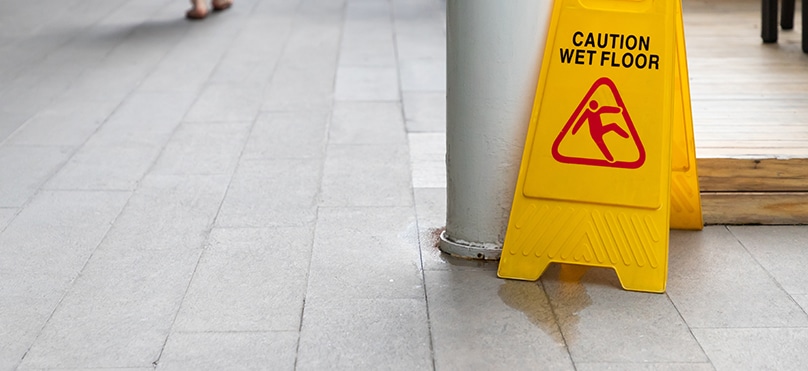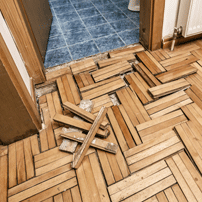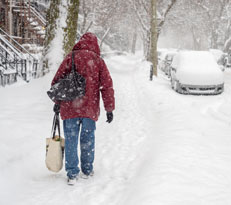
New Jersey Slip and Fall Lawyer
Our NJ Slip & Fall Attorneys Represent Clients on a Contingency Fee Basis · No-Cost Case Evaluation
Owners and managers of businesses, private property, and public buildings and spaces in New Jersey have a legal responsibility to do everything reasonable to protect the public from permanent or hazardous conditions on their premises. A person who is injured because of a hazardous condition that was not protected from access may have a legitimate claim for seeking compensation for medical costs, lost earnings, pain and suffering and other financial damages resulting from the injury.
Eichen Crutchlow Zaslow, LLP is a pre-eminent personal injury law firm in New Jersey with offices in Edison, Red Bank and Toms River. We represent individuals who have suffered significant injury in slip and fall accidents indicating clear liability on the part of the property owner and subcontractors responsible for providing a safe environment for visitors on the premises.
What Is Necessary to Prove Damages?
To prove damages in a slip-and-fall accident claim, it is necessary to prove that the property owner or management was negligent in its responsibility to remove a hazardous condition or protect the public from access to the hazard. For example, falling on a slippery sidewalk during a winter month in New Jersey does not clearly indicate negligence on the part of the property owner. Most people have walked on ice and snow. If the case proceeded to trial, prospective jurors will expect the injured party to explain why more care wasn't taken to avoid falling. On the other hand, spilled cooking oil that was not properly cleaned up in a grocery store aisle may result in a serious injury such as a back or spinal cord injury, to a customer. Jurors will typically have a higher expectation that the store manager should have taken reasonable action to clean up the spill or protect the area from access.
Leading Cause of Fatal Injury for Senior Citizens
In 2014, there were over 29 million slip and fall accidents in America involving senior citizens. Not only did these falls cause seven million injuries, but they cost an estimated $31 billion in annual Medicare costs. While these statistics seem high, they have only grown steadily over the past two years, taking the lives of 27,000 senior citizens annually. This high fatality rate has prompted the Centers for Disease Control and Prevention to treat slip and fall accidents as a public health issue. As a result, the CDC has founded the Stopping Elderly Accidents, Deaths, and Injuries (STEADI) initiative. This initiative calls for more medical professionals to inform their patients of the dangers of slip and fall accidents and how to prevent them. This initiative will also prompt doctors to ask elderly patients if they have suffered a fall in the past years, as injuries can last a while.
Slip and Fall Accidents Caused by Flooring
 Broken and hazardous flooring is one of the top causes of slip and fall accidents. In fact, the National Floor Safety Institute names hazardous flooring as the leading cause of more than one million emergency-room visits for slip and fall injuries every year. CNA, an insurance and risk management services provider recently revealed that tested floors in 50 percent of the sites they surveyed failed to produce a dynamic coefficient of friction level above the minimum threshold. This suggests that the fall prevention programs that many businesses employ are not considering the effects of flooring selection and ongoing maintenance on slip resistance.
Broken and hazardous flooring is one of the top causes of slip and fall accidents. In fact, the National Floor Safety Institute names hazardous flooring as the leading cause of more than one million emergency-room visits for slip and fall injuries every year. CNA, an insurance and risk management services provider recently revealed that tested floors in 50 percent of the sites they surveyed failed to produce a dynamic coefficient of friction level above the minimum threshold. This suggests that the fall prevention programs that many businesses employ are not considering the effects of flooring selection and ongoing maintenance on slip resistance.
Property Owners Must Keep Premises Clean and Safe
If you or a loved one has been injured in a slip and fall accident, the details of the accident may give some clues as to whether negligence was a factor:
- Did the spill, torn carpet, or broken floorboard occur recently, or has the owner had a reasonable amount of time to fix it?
- If there was an object on the floor, did it have a legitimate reason for being there at that time?
- Could the object have been moved to a safer spot without too much inconvenience or expense?
- Was there sufficient lighting to see the hazard and avoid it?
- Was the owner aware of the hazard? Did they set up a warning or block off the area?
Slip and Fall Accidents on Ice
 For New Jersey residents, winter can be a challenge. Ice and snowy conditions can make it difficult for anyone to do their shopping, get to work, or visit friends or family. Moreover, these winter weather conditions are one of the leading causes of slip and fall accidents. Although anyone can be injured in a slip and fall on ice, older Americans are more vulnerable to suffering injuries that are prone to complications and can be difficult to heal. If you have been injured in a slip and fall on snow or ice, it is important to fully understand your legal options.
For New Jersey residents, winter can be a challenge. Ice and snowy conditions can make it difficult for anyone to do their shopping, get to work, or visit friends or family. Moreover, these winter weather conditions are one of the leading causes of slip and fall accidents. Although anyone can be injured in a slip and fall on ice, older Americans are more vulnerable to suffering injuries that are prone to complications and can be difficult to heal. If you have been injured in a slip and fall on snow or ice, it is important to fully understand your legal options.
What to Do After a Slip and Fall on Ice in New Jersey
If you have been injured in a slip and fall accident, stay on the ground while you determine how seriously you are injured. If you can get up safely, take photos of the accident scene, your clothes, and any injuries that you sustained. Icy conditions can change within a matter of minutes, and it is important to take photos right away. Obtain contact information from any witnesses who saw you fall, and contact an experienced slip and fall lawyer right away.
Premises Liability
Depending on what type of property the accident occurred on, there are different rules for establishing liability. Owners of private homes have no duty to remove or warn guests about risks associated with the natural accumulation of winter precipitation, and will not be held liable for accidents that occur due to natural accumulation. However, once a homeowner attempts to remediate the accumulation, and makes the situation worse, they can then be held liable for any resulting injuries.
Owners and occupiers of commercial enterprises, such as stores, restaurants, malls, and apartment complexes, are held to a much higher standard. If the property owner knew or should have known of the dangerous condition, and either failed to remediate, or the remediation made it more hazardous, they can then be held liable for any resulting injuries. Owners of commercial properties have a duty to remove snow and ice. The court will also consider whether the victim of the slip and fall accident had a legitimate reason for being on the premises. An illegal trespasser, for example, would not have legal recourse for a slip and fall accident.
Municipalities also have a duty to keep streets and sidewalks in a reasonably safe state. However, it is rare that a municipality is obligated to clear ice and snow from sidewalks in front of private residences or commercial property. Their duty is limited to the sidewalks in front of public buildings or on other public areas.
Related Information on Slip & Fall Claims in NJ
Contact Experienced Slip and Fall Lawyers in New Jersey at Eichen Crutchlow Zaslow, LLP
If you were injured in a slip and fall accident in New Jersey, do not try to negotiate a settlement on your own. Understand your rights by speaking with an attorney at Eichen Crutchlow Zaslow, LLP. We offer a no-cost case evaluation to answer your questions and determine whether you have a legitimate claim for substantial damages.
From offices in Edison and Toms River, our lawyers advise and represent clients in personal injury and wrongful death litigation matters throughout New Jersey. Call our office at 732-777-0100 or contact us online to arrange a free consultation with an experienced New Jersey slip and fall lawyer near you.
